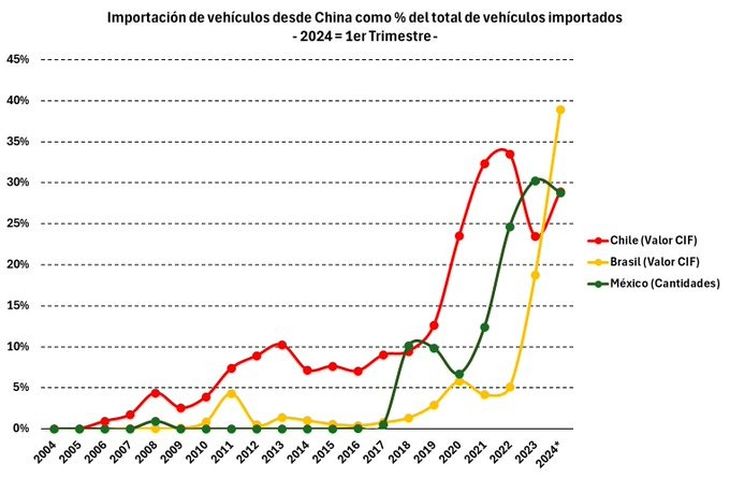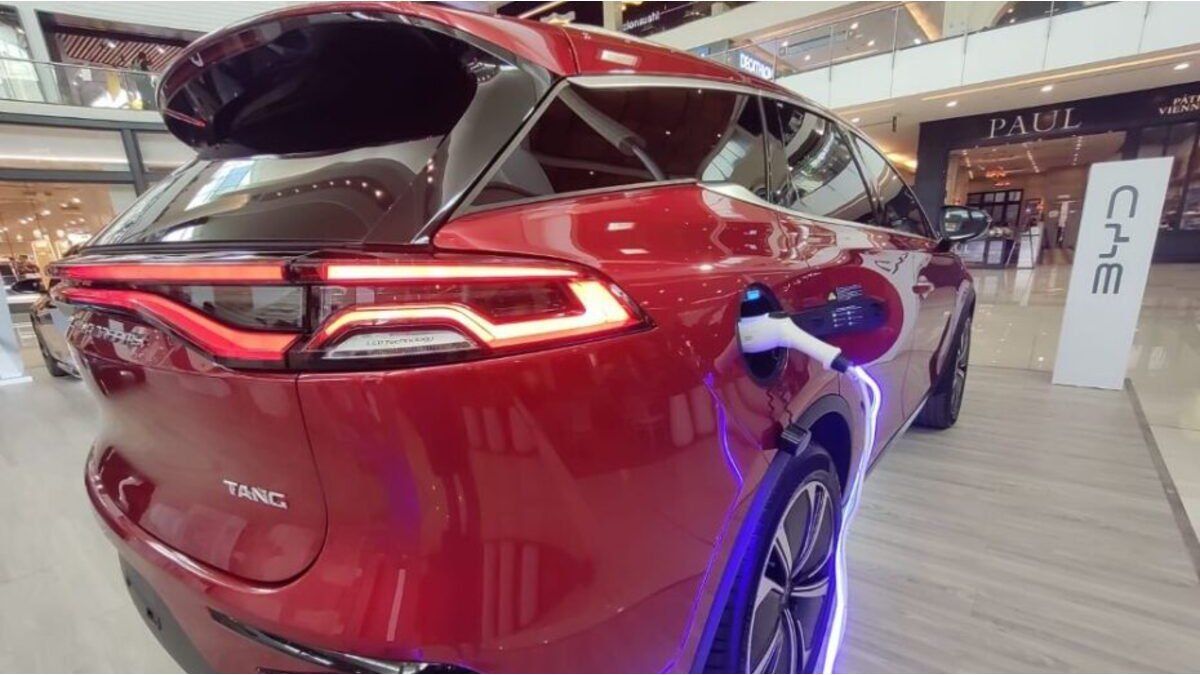The increased penetration of electric cars in Brazil is causing concern in the Argentine automotive sectorbecause it could negatively impact the conventional vehicle exports towards the main trading partner. Although the country enjoys comparative advantages due to its specialization in bilateral trade, the local industry could suffer in the future if it does not advance in the race for electromobility.
A report from the Interdisciplinary Institute of Political Economy (IIEP) of the University of Buenos Aires (UBA) highlighted that In 2023, imports of electric and hybrid vehicles in the neighboring country experienced a jump of almost 180%while so far in 2024 foreign purchases have already exceeded by 43% those made during the entire previous year.
Thus, in the first six months of the year accounted for more than two-thirds of total imports of vehicles, when two years ago they represented less than a third. This is relevant for Argentina given that 40% of its production is destined for the largest economy in South America, according to the latest data from the Association of Automotive Manufacturers of the Argentine Republic (ADEFA).
Electric cars.JPG
While this was largely due to an advance in foreign purchases due to the imminent reestablishment of tariffs by the Lula Da Silva government and the fact that when companies settle in a place they need to stock up, Experts are sounding the alarm when they compare the situation of Argentina with which it is observed in bordering territory.
“While at the local level political conflicts and economic problems prevented progress on an agenda that provides strategic policies for the sector, Brazil has drawn up a solid strategy, reaping a record of investments in the automotive industry, with 11 announcements and disbursements of US$19 billion,” He expressed in dialogue with Ambit, Federico Hidalgoeconomist specializing in the automotive industry.
The professional, who participated in the design of the electromobility bill during 2023, stressed the National Green Mobility and Innovation Program (Mover) Brazilian as the engine of this growth since it imposed new rules, “granting benefits to invest in new technologies and penalizing those companies that maintain outdated engines.”
How this paradigm shift impacts Argentina
Rafael Skiadaressisan economist specializing in the transportation sector, clarified to this media that Argentina has a comparative advantage as it specializes in the export of pick-ups.while imported electric vehicles are almost entirely light-duty.
The coordinator of the “future mobility” mission of the 2030 Productive Plan implemented by the Ministry of Economy between 2022 and 2023 explained that The utility segment is “the one that has the hardest time transitioning” since it requires larger batteries and a more expensive process.
However, he warned that Argentina must monitor the change in composition by origin that has been observed in car imports from the region, with a growing Chinese dominancenot only for electric vehicles but also for conventional ones.
Chinese car imports

Hidalgo agreed on the advantage that the country has due to its specialization but foresees a potential risk from BYD’s installation in Brazilthe most important electric vehicle manufacturer along with Tesla.
This company bought a former Ford plant in 2023 in the state of Bahia with the capacity to produce 150,000 units per year, equivalent to the number of electric and hybrid vehicles registered in the last 12 months, which is expected to begin operating before the end of 2024.
In this context, Hidalgo stressed that the company is considering whether there is a demand for its Shark Pick-up. “If it actually sells, it will compete with models like the Hilux and the Amarok, which is where Argentina stands out, which is why means a threat to complementarity in the automotive trade with Brazil,” he added.
The 3 factors that boosted the electric car market in Brazil
According to the IIEP’s Productive Development and Internationalization area, the growth of the electric car market in Brazil was due to a combination of three factors:
- First of all, Lula’s government decided to eliminate tariff exemptions for electric cars, with the aim of promoting local production. In this context, and in light of the signs that were already emerging in this regard, companies had to incentives to advance imports.
- Secondly, there is a growing trend Consumer inclination towards this type of products. Between 2022 and 2024, the The share of electric vehicles in registrations tripled from approximately 3% to 9%.
- Thirdly, it was extremely relevant that exponential growth that China had in this market: its shipments abroad soared from US$1 billion to US$40 billion between 2019 and 2022, thus becoming the second largest exporter, behind Germany. In this context, Brazil has become the main destination for Chinese carsaccording to the China Passenger Car Manufacturers Association.
In Argentina, car exports collapsed in the first half of the year
According to the IIEP, the vehicle exports Conventional automobiles totaled some US$3.5 billion between January and June, which represented a 8% drop compared to the same period in 2023.
In terms of volumes, ADEFA’s figures showed a contraction of 16.6%Almost a third of this decline was explained by the lower entry of national products into Brazil, which in the accumulated year 2024 accounted for nearly 70% of car sales abroad, while the declines in shipments to Chile, Peru and Colombia were also significant.
Electromobility explosion and challenges for Argentina
The explosion of electromobility at a global level was seen mainly from 2020 onwards. While in 2016 only 700,000 battery-electric and plug-in hybrid vehicles were sold worldwide, in 2023, 14.1 million units were delivered. By 2026, the figure is projected to be 26.6 million, which would represent around 30% of total car sales.
In Argentina, during 2022 and 2023, work was done on the bill that was never presented, but which is currently being promoted by the deputy of Unión por la Patria, Julia Strada.
“Unlike the project promoted by the Kulfas administration, this one It focuses more on productive development than on the development of an internal market “which, taking into account the premature development of the electricity market at a global level and the deterioration of average incomes at a local level, will be difficult to consolidate in the country,” Hidalgo explained in this regard.
“Brazil has China, but we have Japan (with Toyota at the head), which does not want to be left out of this market. The automotive capabilities in Argentina are there, but signals are needed. We must join the electromobility race and start producing and investing in innovation and technology.“, he said.
Source: Ambito
I’m a recent graduate of the University of Missouri with a degree in journalism. I started working as a news reporter for 24 Hours World about two years ago, and I’ve been writing articles ever since. My main focus is automotive news, but I’ve also written about politics, lifestyle, and entertainment.




